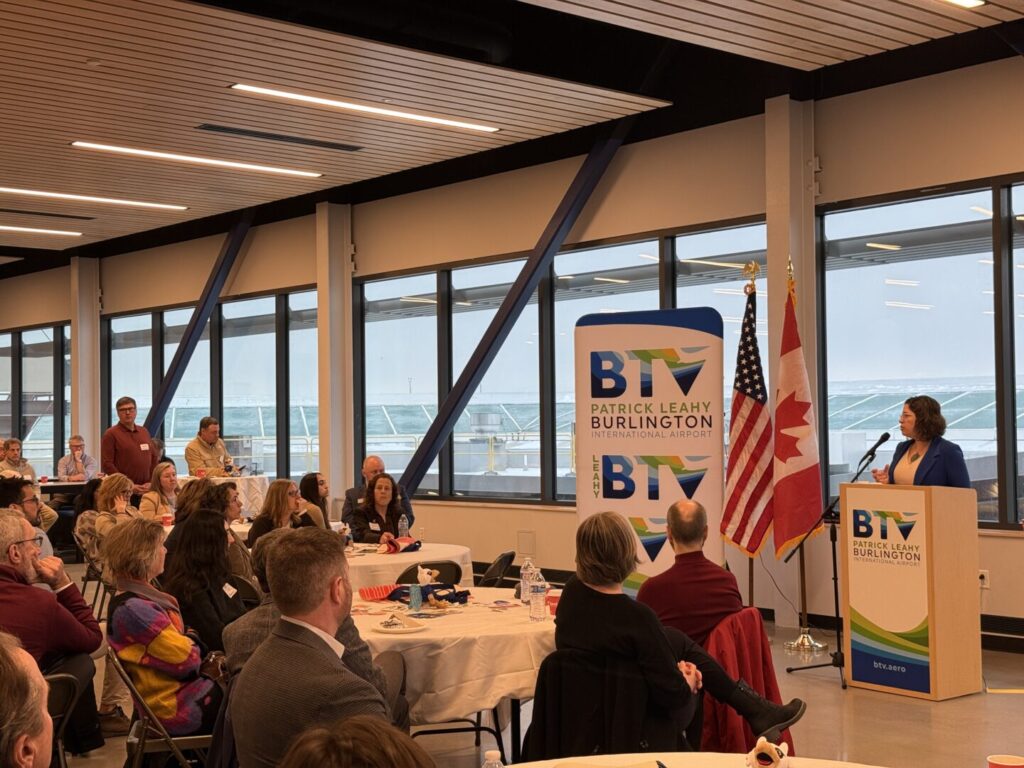Thank you to this week’s sponsor of our Advocacy Update:

March 28, 2025
The pace of the legislative session is picking up. Legislators in the House are spending more time on the floor as they pass the budget and debate privacy legislation. In the time when they were not on the floor, members of the House worked to close their portions of a larger education transformation bill which they aim to pass by April 11th.
In this week’s update:
- Thanks to all who attended our fantastic legislative breakfast series
- If Congress cuts funding, 10 Vermont legislators will take the wheel
- Property tax plan paves path for picking winners and losers – we’re not talking just about second homes
- Education transformation bill on the move
- The Laundry List
We strive to make these concise and easy to read. Feedback is not just welcomed, it’s encouraged – [email protected]
Thank You For a Fantastic Legislative Breakfast Series
We hosted our final breakfast in the series Monday at Patrick Leahy Burlington International Airport capping off a series that highlighted our region’s advances in aviation. Attendees had the opportunity to hear from Burlington’s Mayor, Emma Mulvaney-Stanak and the Secretary of the Agency of Commerce and Community Development, Lindsey Kurrle.
Thank you to our sponsor, EastRise Federal Credit Union for making this event possible.



If Congress Cuts Funding, 10 Vermont Legislators Take the Wheel
It wasn’t that long ago that our Legislature was writing language to enable a handful of legislators to spend millions of federal dollars if they became available outside the legislative session; this week, they voted on what to do if they are taken away…
Catch up quick: As we’ve covered previously, storm clouds are brewing in Congress that could have disastrous budget implications for Vermont.
- Death by a 1,000 cuts: already, Vermont is experiencing the loss of federal funding coming into the state through grants and programs perhaps exceeding $400 million, all due to administrative action to cut off funding.
- However, not all of them directly affect the state budget, and the state has yet to lose money due to congressional action.
Eyes on the Nation’s Capital: The gap between the US House and Senate has decreased this week, and Congress could vote on a reconciliation package as early as next week, though the ultimate deadline is Memorial Day.
- If these trillions of federal cuts happen, Vermont could lose a substantial amount of the $3.2 billion of federal dollars it uses in its state budget.
The Money Committee Chairs bracing for a fiscal emergency was clear in VPR’s Peter Herchfield’s story that ran this week.
- The story featured a quote from the Chair of Senate Finance that “If things sugar out so that large numbers of people would be hurt, I would consider a Snelling-esque [income] surcharge at some level to keep from cutting holes in the safety net and putting more people into the homeless category.”
Prior debate: Despite being on the brink of massive revenue loss, legislators voted to spend $77.2 million to buy down property tax rates, keeping them increase from 5.8% to instead 1.1% – the dissenting vote on the Committee voted no because they thought these funds should be held for impending federal cuts.
Contingency planning: The cuts Congress is considering could hit outside of the legislative session, and the budget drafters decided they needed to create a contingency for this.
- Buried in page 127 of the budget is some extraordinary language directing that if federal funding decreases by 1% or more compared to the most recent appropriations act, the Secretary of Administration must develop a spending reduction and transfer plan for approval by the Joint Fiscal Committee, which is made up of just 10 legislators.
There are some guidelines: Any total reductions or transfers must not exceed the amount lost in federal funding. This can be achieved by using the General Fund Balance Reserve to temporarily cover funding gaps, reverting unspent or unobligated funds, eliminating spending authority, or approving limited spending reductions or reallocations.
Property Tax Plan Paves Path to Picking Winners and Losers – We’re Not Talking About Just Second Homes
This week, the House Committee on Ways and Means heard testimony on their proposal to segregate the non-homestead property tax into nine classes of property taxpayers, each with its own tax rate. Currently, Vermont has two rates, homestead (primary residences) and non-homestead (commercial, secondary residences, apartment buildings etc). Below is our best effort to visually represent how the rates would be decided.

Legislative counsel created this flowchart, which is less descriptive and broad.
Added Complexity: Currently, this decision tree ends after you determine whether you are a homestead or non-homestead taxpayer, with the exception of some tax assistance for affordable housing units.
- Just last week, the Legislature agonized over whether to shift more of the burden of this year’s increase in education spending to non-homestead ratepayers before ultimately deciding on uniform treatment.
- Now, imagine the Legislature had nine different classes of non-homestead payers, and they could choose to increase one or two of them to keep every other rate class level.
This was the concern conveyed by the Lake Champlain Chamber, which registered opposition to the proposal, stating concerns that increasing the number of rate classes will increase complexity, minimize voter accountability, narrow the tax base, and ultimately lead to the Legislature picking winners and losers.
- Members of the Committee tried to contest this hypothetical and were quickly proven wrong by their colleague who asserted, “It’s our job to make sure the right people are winning.”
Zoom Out: The “right people” of today might not be the “right people” of tomorrow; it’s a dangerous proposition to open the door to this annual exercise.
Bottom Line: To keep our tax system less complex and eliminate an annual exercise of picking winners and losers, the Legislature should abandon any proposal to segregate the non-homestead property tax rate into rate classes.
Education Transformation Bill on the Move
The pieces will soon come together with the hope of the House sending an education transformation bill to the Senate by April 11th. All five pieces of the legislation, from different committees, are expected to be consolidated in the Ways and Means Committee and voted out by next Friday.
The House Committee on Education is wrapping up its portion of the bill today. It will then send it to the House Ways and Means Committee, which will fold in its bills on regional reappraisal and property tax changes.
What’s in the Education Committee’s Language: The House legislation primarily adjusts the scale of Vermont education delivery and creates a sub-committee of the Commission the Future of Public Education to create new school districts.
Scale:
The legislation proposes minimum district, school, and class sizes and includes language about how the state would respond if these were violated and begins the process of consolidation. Consolidation language includes,
- Consolidating Vermont’s districts to a minimum of 4,000 students each,
- Mandating minimum class sizes per effective grade, and
- Proposing a minimum school size of 450 effective July 1, 2026.
If schools were unable to meet these minimums and needed to close, they would need to designate three or fewer of the public schools to serve as the public school or schools of the district.
School district boundary subcommittee:
The bill tasks a new subcommittee comprised of five appointed members and functioning as part of the Commission on the Future of Public Education to draft potential district maps with no fewer than 4,000 students per district.
The Laundry List
Hundreds of hours of committee discussion each week culminate into our advocacy update, so not everything makes it into the overall update; however, we often cover what is left on the cutting-room floor here for our most dedicated readers.
- Read previous updates: Week 1, Week 2, Week 3, Week 4, Week 5, Week 6, Week 7, Week 8, Week 9, and Week 10.
- After a long saga, late Friday, FinCEN issued a temporary rule suspending Beneficial Ownership Information reporting requirements for all U.S.-formed business entities. Only foreign-formed companies registered to do business in the U.S. still need to file. The rule is effective immediately, with a 60-day comment period before a final version is considered. While FinCEN’s authority to eliminate reporting for 99% of affected businesses is questionable, any legal challenge would take time. For now, BOI reporting is effectively on hold. Read more via this press release.
- This week, the Senate unanimously passed their privacy bill, S.71, which we covered previously. The House also passed a bill related to privacy for law enforcement and judges, H.342, after a contentious week of negotiations.
- This week, the Secretary of the Agency of Commerce and Community Development penned an op ed about how appeals drive up housing costs that is worth a read.
- Act 181, passed last year, transitions Vermont’s land-use regulation to place-based jurisdiction. As part of that, land needs to be categorized. An initial draft of that is now available via the Act 181 Map Viewer. This map viewer displays the draft regional future land use map and allows users to provide direct feedback on the map.
Hey! You read the whole update. You probably have some thoughts on the content or how we delivered it. Feel free to reach out to us at [email protected].